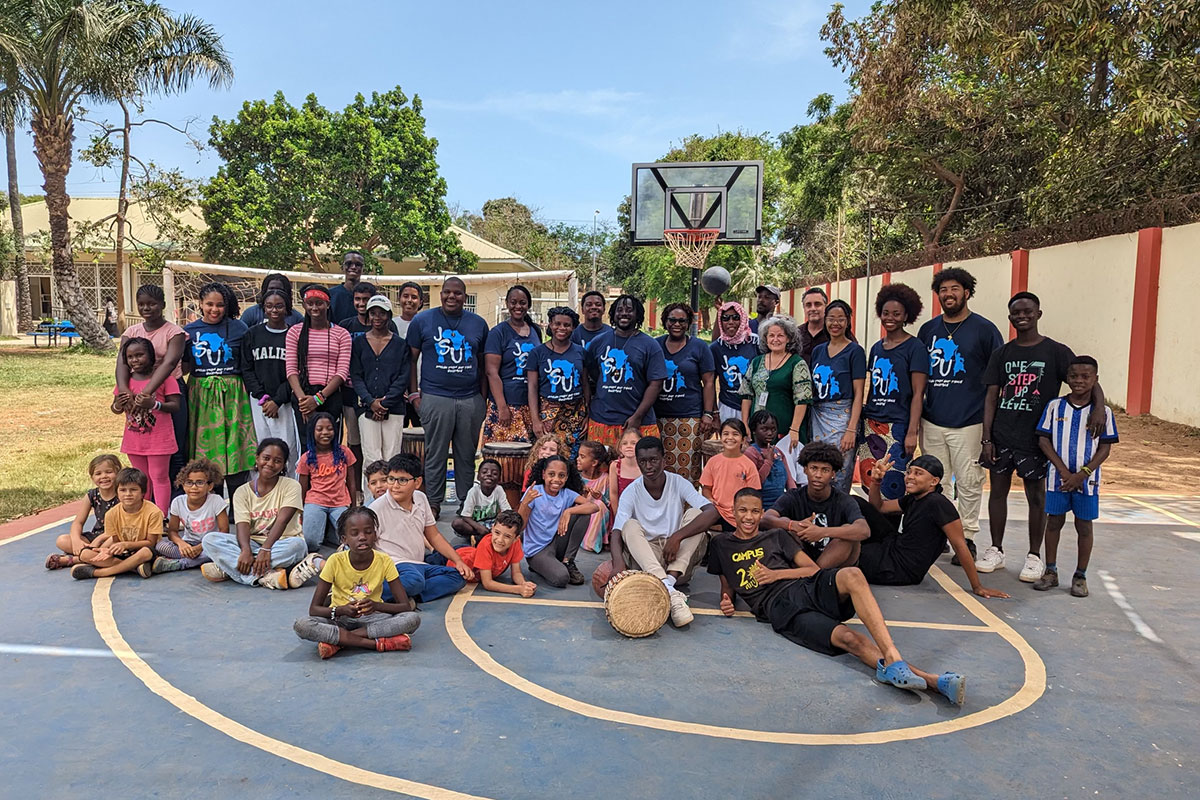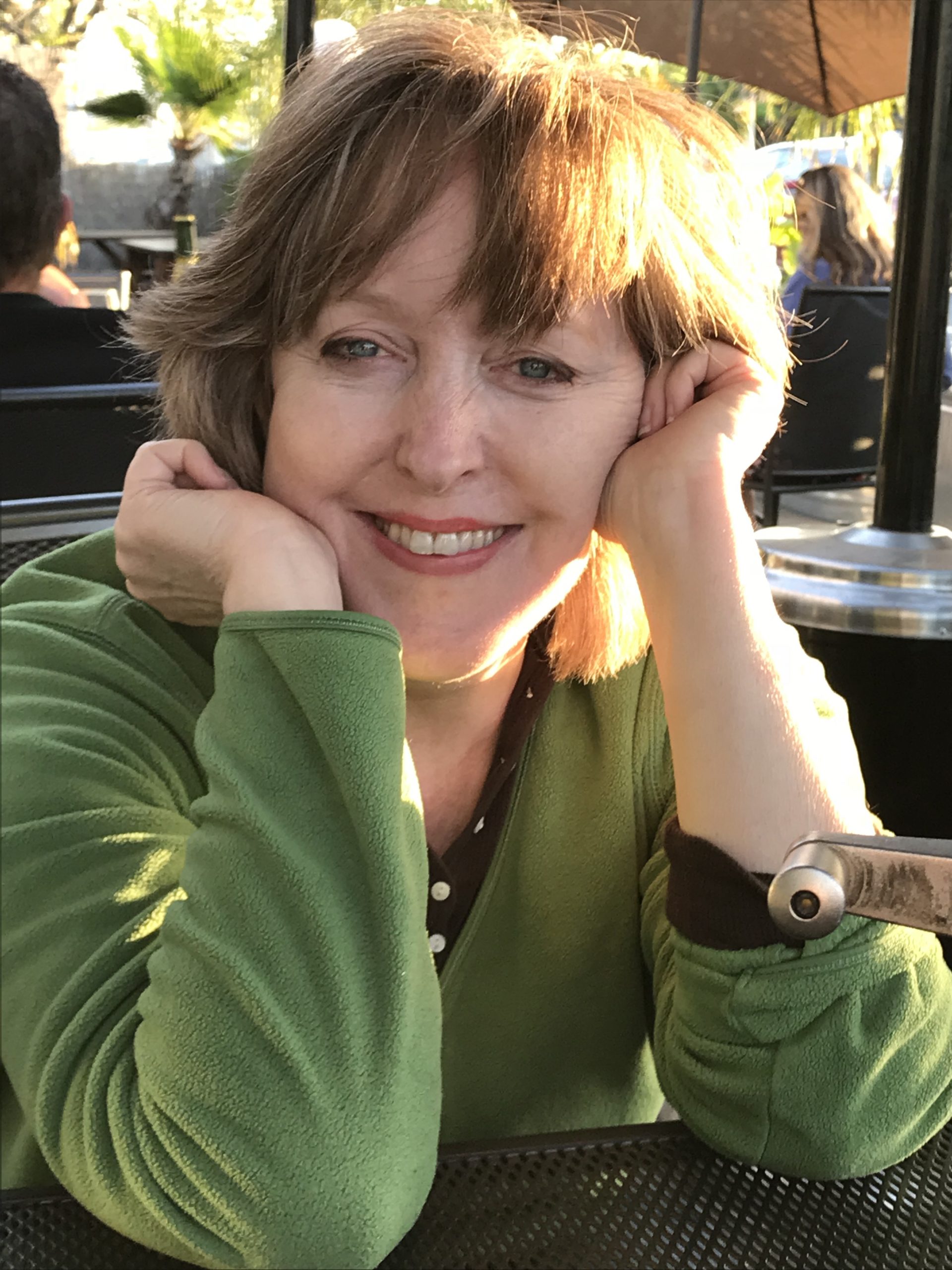JACKSON, Miss.—Nicholas Organ drummed with others under a night sky in The Gambia, West Africa, watching fellow members of the Jackson State University African Drum and Dance Ensemble learn intricacies of a dance in the art form’s native land. The evening was hot. Nature surrounded them in a way that is rare in Mississippi’s capital city. Coconut trees swayed nearby. Bare feet made direct contact with the earth. Organ’s eyes drifted up, settling on the blood crescent moon overhead. “That’s beautiful; that’s pretty cool,” he thought.
When he looked up again a bit later, he could see the crescent getting thinner as they played. “It was this close to becoming a new moon,” Organ told the Mississippi Free Press, his fingers almost touching in a pinch. Right there—during one of the first formal classes ensemble members had on their trip to Banjul, The Gambia, this past May—this looked like a sign.
Organ described the moment as not so much an initiation, in the midst of this mutual embrace of and by a culture that African Americans had been separated from for generations, but more like the announcement of a new beginning. “A divine wink,” he called the feeling that resonated as they were in the midst of drumming and dancing.
“I even got a little bit emotional,” Organ, a 2023 JSU graduate now pursuing a master’s degree in music education at Jackson State, said. “I wasn’t expecting to make it back to the motherland so soon. I thought I would have to wait for years.” The opportunity to not only go, but to also dive deep into the music that he loved, had a profound effect, he said.
Organ was among 11 ensemble members for whom the May 18 through June 1, 2023, trip to The Gambia—a small sliver of a country, surrounded by Senegal, with a narrow Atlantic coastline—leaves a lasting influence that is musical, cultural and personal. A $40,000 grant from the Mali-based nonprofit Instruments4Africa and the U.S. Department of State in part funded this cultural exchange and immersive experience to study the music, dance and culture of several West African ethnic groups, the Jola, Wolof and Mandinka people.
The ensemble raised $5,000 toward their trip, JSU Music Department Chair Lisa Beckley-Roberts said, and the group continues to actively raise funds this year through donation-based community classes and contributions.
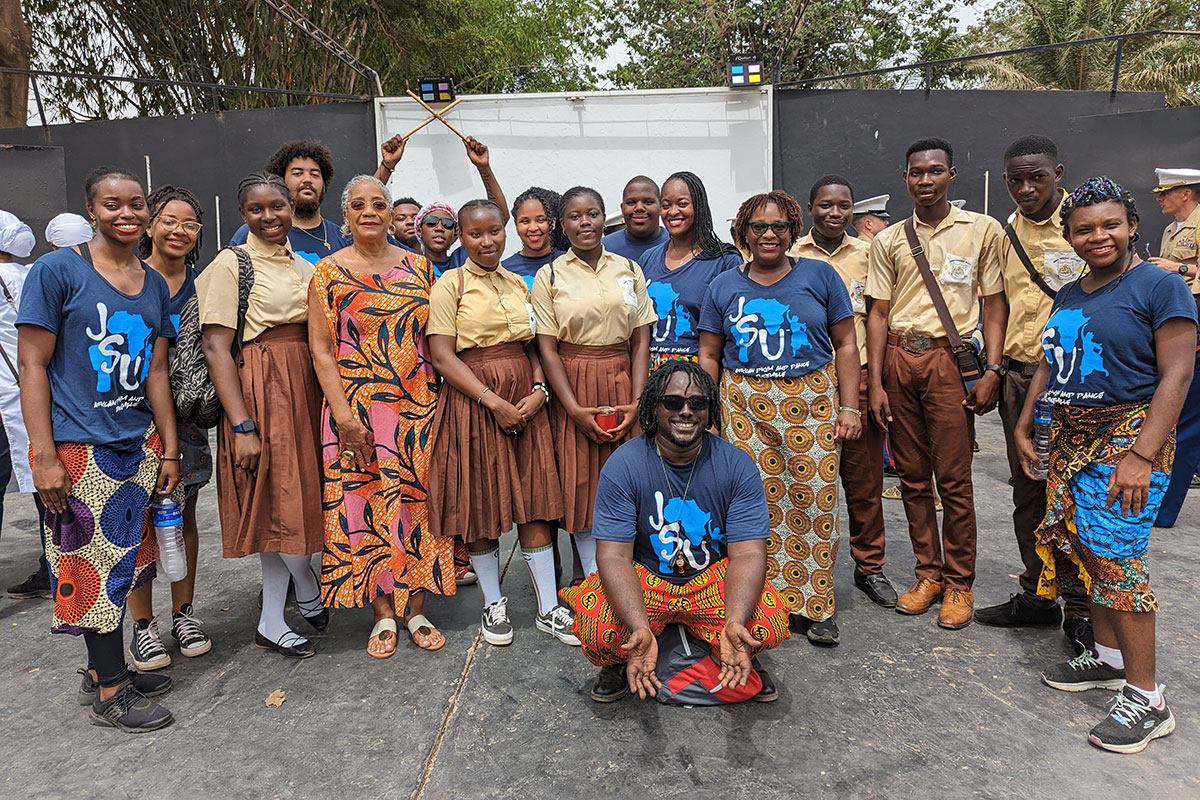
Beckley-Roberts’ February 2022 virtual presentation to The Gambia Department of State about African Americans channeling African music and dance to address community and health-related issues sowed the seeds for this partnership and trip.
For Beckley-Roberts, ethnomusicology professor and ensemble director, the trip’s standout moment came within the first few days following a dance class when they sat in a big circle to talk. She wanted to know what their teacher thought of their coming and their hunger to learn and absorb the culture. “So often, we hear about culture vultures,” Beckley-Roberts said, voicing a concern about how they might be perceived.
“Everytime I talk about it, I tear up,” the professor, known fondly by her students as “Dr. B-Rob,” told the Mississippi Free Press. “But she said, and I’m paraphrasing, … that this was our culture, and she was glad that we were there, reclaiming it. It was our legacy. It was our inheritance–that word, she said in particular—it was a part of our inheritance, and that we needed to come back, we needed to tell other people to come back and to get this knowledge.”
“It was almost like a sigh of relief for me,” Beckley-Roberts continued. “It was just a beautiful moment for me as a descendant of people who left that land enslaved to go back and to be told by people that they still saw us as a part of that legacy.”
The educator saw it, too, as an unburdening of ancestors’ prayers to go back to Africa, now manifested generations later. “That was very poignant for me, and it reinvigorated my thoughts about why I was doing what I was doing,” she said.
‘It Comes from the Homeland First’
The first day of class at Jackson State, Aug. 21, 2023, brought the chance for young musicians to reflect on their trip and to share experiences that broadened perspectives and touched special, personal chords.
Angel Coffman, a JSU junior in music education, described a dance circle in a Mandinka village and the scene: “Behind a curtain, so inconspicuous, you would think it’s just somebody’s house.” Walled off by sheets, just enough to define the space, the setting inside was electric. “They had face paint, they had costumes, they had feathers, and they’re doing all types of dances,” she continued. “They’re getting in your face. It’s just a whole different energy that comes with it.
“It was like a power energy,” Coffman said, dominant and confident. “All the face painting, all the feathers, all the colors and shells they had on them … I could compare it to an Indian chief,” with bigger headdresses and details signaling the hierarchy. “Anytime I see dancing or anytime I hear music, I equate it back to Africa because I feel like a lot of music that we have, yeah, we can put our own touch on it, but it comes from the homeland first.”
Organ, laughing, recalled a jamming session, outside at dusk as cattle gathered at a fence to listen. “Two or three bulls walk up … and they stop, and they end up watching us,” he described. “They’re literally our audience. And then, five minutes later, two more bulls come up. … Next thing I know, there’s five to six bulls, looking at us play. They look like they’re vibing with the music. It’s a funny story, but I think it also speaks to the power of the music, as far as its connection to nature.”
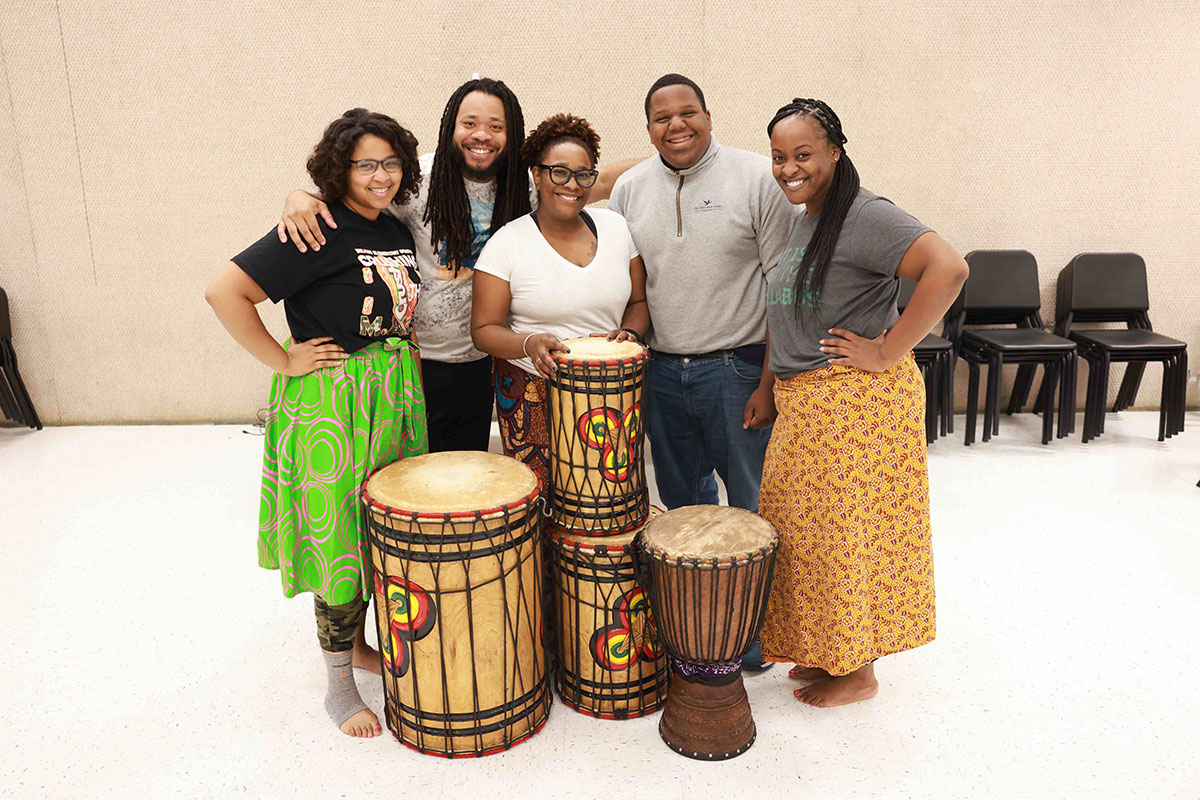
The group’s takeaways from the trip to Africa go beyond drum and dance. Ayahriyah King, a JSU sophomore in social work, was struck by the hotel staff’s concern for her well-being when she came down with a bug. They brought her coconut water, baobab fruit and lemongrass tea. “I got healed pretty quick,” she said. “The culture is very loving.” Calling the trip “a blessing,” King said she will carry forward the new knowledge she acquired of Africa and African dance and instruments they played, including djembe and kora, folding all that into the practice it takes to become better at something new.
Regan Jackson remembered the fish market they visited close to their last day and the teamwork it took to get the ocean’s harvest to customers. Her nose wrinkled at a remembered whiff, but her eyes shone, recalling the scene.
“It was a beautiful moment, seeing everyone working together, from the people going back and forth to get the fish, the women cooking, men cooking, and everyone in the boat in the water, and they’re pulling the fish from the net,” she told the Mississippi Free Press. “… Sometimes we take it for granted in the United States, about the life that we live and how we are able to get the food.”
Jackson said she took home lessons of focus and cooperation. Even if disagreements arise in the ranks, “you have to keep smiling, keep going, and remember your purpose for being there,” she explained. A double alum with bachelor’s and master’s degrees from JSU, Jackson is now a music teacher at Wilkins Elementary and a doctoral candidate at Belhaven University. “You could just see them working together and how they’re using their culture to provide for families.”
The educator added a section in her elementary-school classroom’s curriculum under the topic, “We all belong together,” she said. “That’s one of the things that I’m trying to take away from the trip to Africa. We may come from different places, we may look different, we may talk different, sound different, but we all belong together and make up one big, happy family.”
The ensemble’s invitation to a naming ceremony in The Gambia stood out in JSU junior Phillip Kelly IV’s memory of the trip. Beckley-Roberts explained that a newborn receives their name on the ninth day following their birth. The way they wrapped outsiders into the celebration touched Kelly.
“It was just good to see how that community welcomed a child coming to this Earth and being able to interact with them,” he explained. These interactions included the invitation to dance at the occasion. “I don’t like to dance,” Kelly said, chuckling, “but they ended up bringing me up there to dance, and I really enjoyed myself.”
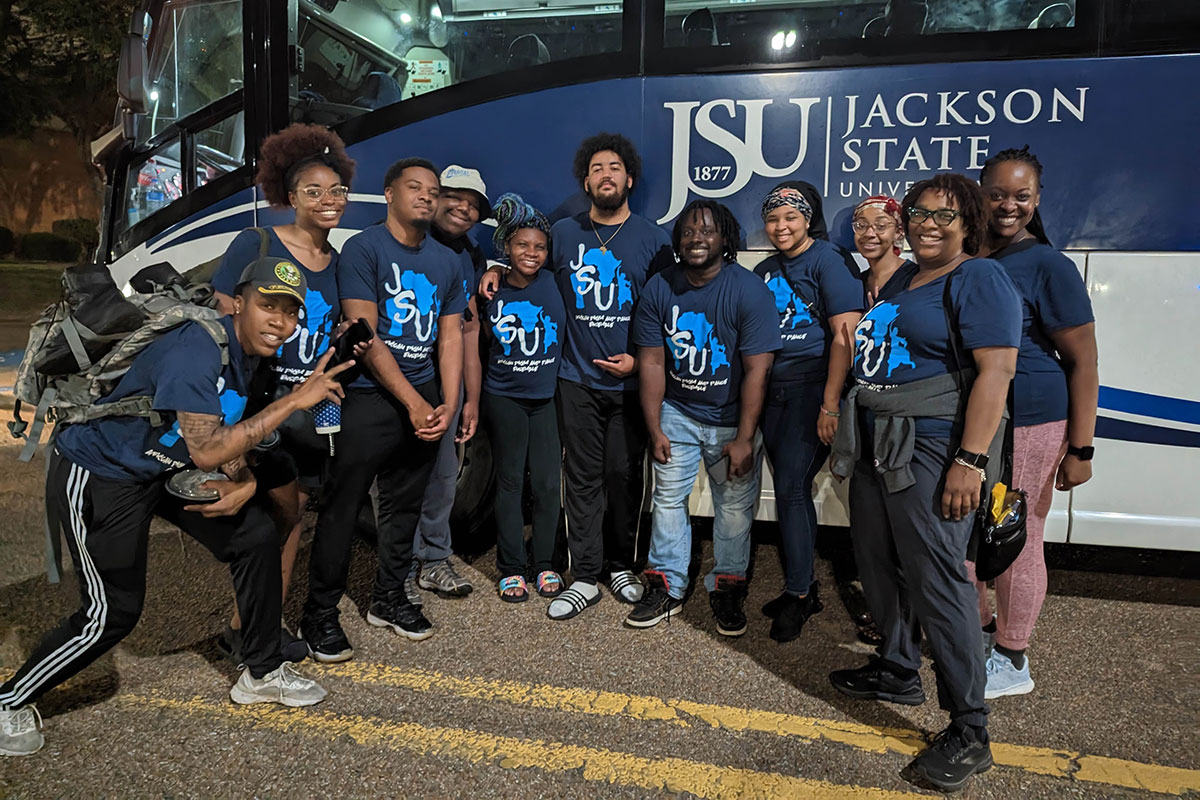
Amari Roberts, Beckley-Roberts’ son, a 10th grader at the Education Center and a community member of the ensemble, was drawn to a beach scene of fishing boats coming back with their haul and the community’s helping to pull them in.
“I was happy I was able to come in and help,” he said. “You could tell some of them knew each other and some of them didn’t, but they all helped pull them in.” Afterward, everyone got fish. “The people whose net and boat it was, they weren’t being greedy; they were sharing. And coming from an American aspect, that’s, like, crazy. All this money in fish!” But they just wanted everyone to be fed, he recalled. “It was a really wonderful experience.”
On the musical end, Roberts learned a lot of different rhythms and how they could tie into the culture of the community and how that could affect people today. “Not only just the music itself, but how we could bring it back to America, and really be able to help the community with this music, which was forgotten, or just lost over time,” he explained. The djembe Roberts brought back from The Gambia will have a role in that.
‘You Actually Represent Black America’
Organ said the trip and their experiences “blended into one huge part of who I am now, who I’m becoming as a performer—because I also play trombone, my primary instrument—and now as a new teacher, teaching music.”
“It’s a part of the college experience, a part of education, to expand your world, and I definitely think that happened,” Beckley-Roberts said. In addition to the music and dance they learned, ensemble members returned with a realistic view of Africa and Africans that they intend to share with family, friends and their communities.
“I think that we learned a lot about ourselves and about how we represent ourselves, our family, our community (and) our country (while) being abroad,” Organ said. “And, we learned a lot about other cultures. … and how they see themselves as part of a larger unit. I don’t know that we always do that in the United States. I think that we often see ourselves as individuals … without realizing that when you go somewhere else, you represent all of Jackson State, you represent all of Jackson, Miss. You actually represent Black America.”
“When we get to see ourselves in that way, and be perceived in that way, I just think it’s an opportunity for growth all around,” he concluded.
In the same way that the trip opens up possibilities for individuals, it opens up a vision for the ensemble, Beckley-Roberts said. “We’ve already been invited back, and we had invitations while we were there to go to Morocco.”
“If the mission of this institution is challenging minds and changing lives, then what better way than to offer the world to these students and really prepare them to be global leaders, with hands-on experience at that?” she posited. “And why not do that here in the Department of Music? And with an African-centered voice, as we reframe the mission of HBCUs to meet the contemporary needs of people of African descent and people who are, in general, marginalized.”
“Those are the people we have always historically served, and we have to adjust our mission, and I think this has to become a part of it—reclaiming that culture and explaining, exploring and elucidating the ways that that is our culture,” Beckley-Roberts said.
Donations to JSU Development Foundation-African Drum and Dance Ensemble can be sent to Dr. Lisa Beckley-Roberts at the following mailing address: 1400 John R. Lynch St., P.O. Box 17055, Jackson, MS, 39217.

